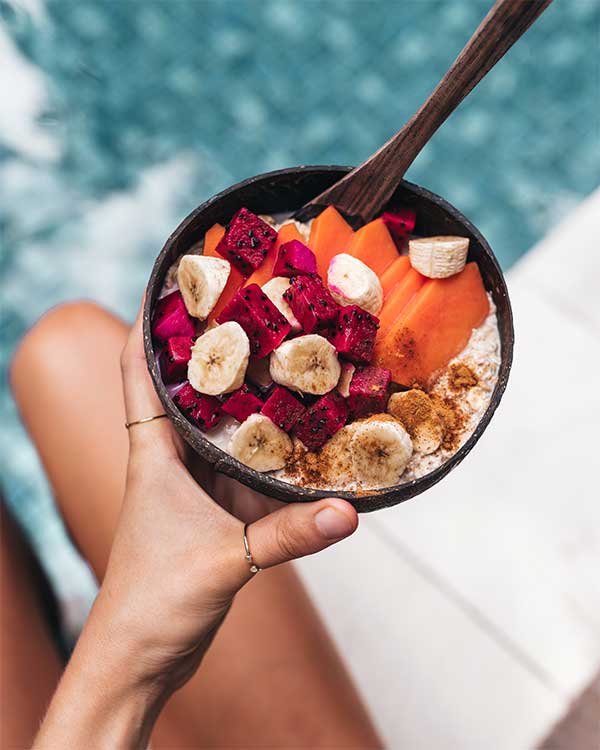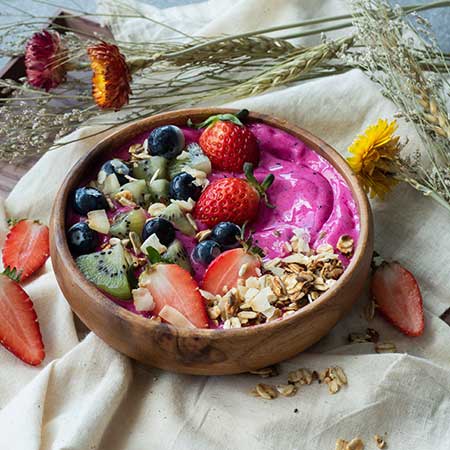By Ginger Cochran, MS, RDN, CPE, CDCES
As a registered dietitian nutritionist specializing in women’s health, I like to find simple solutions to meet women’s complex needs. There are no limits to what women can accomplish, especially with good foundational health. Practicing good nutrition, exercise, and lifestyle habits are the cornerstone for keeping women strong and energized to take on whatever life presents. There are key nutrients that are essential in maintaining optimal health and balance for women. In this article, we take a closer look at these vital nutrients.
Healthy Bones
Vitamin-D, Calcium, Phosphorus
Approximately 50 percent of women over the age of 50 have low bone density or osteoporosis. Osteoporosis and low bone density can be prevented by increasing bone-building nutrients in the diet. Bone-building nutrients, calcium, phosphorus, and vitamin D are essential at every stage of life and most important in early adulthood when bones absorb more calcium.
Calcium and phosphorus are necessary to build the bone matrix. Vitamin D is needed to help absorb the calcium and phosphorus into the body. Women need 1,000-1,200 mg of calcium, 5-10 mcg of vitamin-D, and 700 mg of phosphorus a day. Designer Protein’s Aria Women’s Wellness Protein Powder contains 300 mg of calcium, 500 mg of phosphorus, and 3 mcg of vitamin D, making it the perfect addition to a women’s diet. Other foods that include all three bone-building nutrients are sardines, whole milk, and plain yogurt.
Iron & Women
Iron deficiency can sneak up on you and can take months to resolve fully. Low iron can cause a multitude of symptoms like fatigue, hair loss, and depression. Women are more likely to develop deficiencies due to menstruation, lactation, pregnancy, and childbirth. The Recommended Dietary Allowance (RDA) is 18 mg for adult women, 27 mg during pregnancy, and 9 mg during lactation. Include multiple iron-rich foods in your daily diet to prevent low iron stores.
Excellent sources of iron include:
- 2 scoops Aria Women’s Wellness Protein Powder(1.8 mg)
- 3 ounces oysters (3.5 mcg)
- 3 ounces beef (3.1 mcg)
- 3 ounces chicken (.6 mcg),
- 1/2 cup kidney beans (2.1 mcg)
- 1/2 cup tofu (3.5 mcg)
- 1 ounce of pumpkin seeds (2.1 mcg).

Skin and Hair Essentials
Stress, life transitions, pregnancy, lactation, and aging can take a toll on hair and skin, resulting in hair loss, brittle hair or nails, stretch marks, and inelasticity. It is crucial to provide nutrients to the skin and nails for protection and cell regeneration. Vitamin C helps stimulate collagen synthesis and protect the skin from UV-induced photodamage. Biotin, aka vitamin H, is vital for metabolism, energy, skin, and nails. Biotin deficiencies can cause skin rashes, hair loss, and high cholesterol. Quality protein is another key player in skin, nail, and hair health. The amino acids found in high-quality proteins are the building blocks for collagen, elastin, and keratin. Taking in enough protein will help maintain hair strength, volume and prevent graying. Lack of protein will cause hair loss, premature aging of the skin, and brittle nails. Include high-quality protein at each meal and snack. Quality proteins are easily absorbed in the gut, such as dairy, whey, soy, eggs, and animal meats.
Folate & The Brain
Most women do not get enough folate in the diet. The correct amount of folate is needed to build red and white blood cells, metabolize carbohydrates, and promote cell growth and function. There is evidence that folate may also help treat depression and prevent dementia. During pregnancy, folate is essential for early fetal brain and spinal cord development. Women need to have sufficient folate stores during pregnancy to prevent some congenital disabilities. It is recommended women increase their folate intake three months prior to conception to ensure they have sufficient stores. The recommended daily amount of folate for women is 400 mcg non-pregnant, 600 mcg pregnant, and 500 mcg while breastfeeding.
Excellent Sources of folate include:
- 2 scoops Designer Protein Aria (400 mcg)
- 1 cup edamame (482 mcg)
- 1 cup lentils (358 mcg)
- 1 cup asparagus (268 mcg)
- 1 cup spinach (263 mcg)
Fiber
Fiber intake promotes hormone balance and decreases the risk of breast cancer in women. This may be due to fiber's ability to help eliminate excess estrogen in the body. Fiber also helps balance gut health, promotes a healthy weight, and decreases the risk for heart disease. The goal for women is 25 mg of fiber (or more) per day. Including one to two high-fiber foods (3 grams or more) at each meal and snack will help you meet your fiber goals.
Excellent sources of fiber include:
- 2 scoops Designer Protein's Aria (3 grams)
- 1 large pear with skin (7 grams)
- 1 cup fresh raspberries (8 grams)
- ½ medium avocado (5 grams)
- 1 ounce almonds (3.5 grams)
- ½ cup cooked black beans (7.5 grams)
- 1 cup cooked pearled barley (6 grams)
Vitamin B12
Lack of B12, also known as cobalamin, in the diet may cause fatigue, poor concentration and increase the risk of osteoporosis and heart disease. Our ability to absorb B12 decreases as we age. B12 is bound to protein in food and must be broken off during digestion. As we get older, our bodies are less efficient at this process, causing an increased need for high B12 proteins.
B12 is needed for red blood cell formation, a healthy metabolism, nerve cell function, and DNA synthesis. Women 19 years of age and older need 2.4 mcg of B12 a day. During pregnancy, women need 2.6 mcg and 2.8 mcg while lactating.
Excellent sources of B12 include
- Nutritional yeast (1/4 cup = 8.3 mcg)
- Tuna (3 oz= 9.3 mcg)
- Salmon (3 oz= 2.6 mcg)
- Yogurt (3/4 cup=1 mcg)
How to make it work for you
Fitting in all these nutrients doesn’t have to be complicated. It’s easy to become overwhelmed, so I'm a big fan of keeping it simple. This is why I love Designer Protein’s Aria Women's Wellness Protein Powder. Aria had scientifically formulated this product to meet the unique needs of women. Just two scoops of Aria include 15g of high-quality whey and soy protein isolate, only 1g of sugar, probiotics to support both digestion and mental health, 100% of women’s biotin, vitamin-D, calcium, phosphorus, and iron; plus vitamin C, and folate requirements. It is your one-stop-shop for meeting women’s specific nutritional needs. I confidently recommend it to my pregnant clients, knowing it’s helping them meet the nutritional needs of both mom and baby.
Bonus: it tastes fantastic!
You can use Aria protein powder in shakes, baking, smoothies, chia seed pudding, or oatmeal.
My favorite Aria shake is 1 cup of plain coconut yogurt, 1 cup oat milk, 1 Tbsp flaxseed, 1 cup mixed berries, and half a banana for the perfect superfood drink for women's nutritional needs.
Sources:
WebMD: Nutrition for Women at Every Age - https://www.webmd.com/women/features/women-nutrition
Today’s Dietitian: Nutrition and Lifestyle Solutions to Female Hair Loss - https://www.todaysdietitian.com/newarchives/0120p44.shtml
Healthline: 9 Health Benefits of Vitamin B12, Based on Science - https://www.healthline.com/nutrition/vitamin-b12-benefits
National Institute of health: Vitamin B12 - https://ods.od.nih.gov/factsheets/VitaminB12-HealthProfessional/
The American Journal of Clinical Nutrition: Effect of daily fiber intake on reproductive function: the BioCycle Study - https://www.ncbi.nlm.nih.gov/pmc/articles/PMC2744625/
Academy of Nutrition and Dietetics: Easy Ways to Boost Fiber in Your Daily Diet - https://www.eatright.org/food/vitamins-and-supplements/types-of-vitamins-and-nutrients/easy-ways-to-boost-fiber-in-your-daily-diet
MyFoodData: Foods High in Folate - https://www.myfooddata.com/articles/foods-high-in-folate-vitamin-B9.php
WebMD: Benefits of Vitamin-C - https://www.webmd.com/diet/features/the-benefits-of-vitamin-c#1
Nutrients: The Roles of Vitamin C in Skin Health - https://www.ncbi.nlm.nih.gov/pmc/articles/PMC5579659/
Mayo Clinic: Biotin - https://www.mayoclinic.org/drugs-supplements/biotin-oral-route/description/drg-20062359
Healthline: Biotin for Hair Growth - https://www.healthline.com/health/biotin-hair-growth




